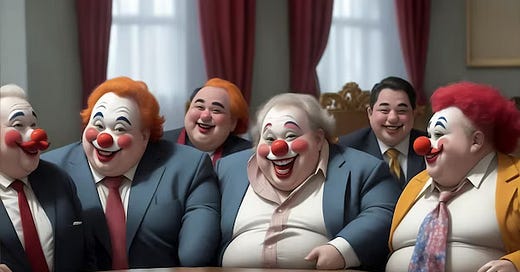Ch 1.9 | 👎The problems
Our political system has become the major barrier to solving nearly every important challenge our nation needs to address. Here’s a primer that’s worth a view minutes.
The Washington Post’s Karen Tumulty explained the problem in her aptly titled column "Who elects these clowns, exactly? As it turns out, almost none of us.” She highlighted how it is not only a few members of the House of Representatives who continually cause chaos in our government, but that only a small number of voters truly have a say in who gets elected.
As long as Congress remains captive to the current incentives of the "political-industrial complex," these challenges will only deepen. And it’s important that we recognize the system isn’t broken — it’s working as designed, if not intended.
Prior to publishing "The Politics Industry: How Political Innovation Can Break Partisan Gridlock and Save our Democracy," Katherine Gehl and Michael Porter explaiend the situation in their seminal 2017 Harvard Business School report, "Why Competition in the Politics Industry Is Failing America: A strategy for reinvigorating our democracy."
Washington is delivering exactly what it is currently designed to deliver. The real problem is that our political system is no longer designed to serve the public interest, and has been slowly reconfigured to benefit the private interests of gain-seeking organizations: our major political parties and their industry allies.
They expound further:
Most people think of politics as its own unique public institution governed by impartial laws dating back to the founders. Not so. Politics is, in fact, an industry— most of whose key players are private, gain-seeking organizations. The industry competes, just like other industries, to grow and accumulate resources and influence for itself. The key players work to advance their self-interests, not necessarily the public interest.
It’s important to recognize that much of what constitutes today’s political system has no basis in the Constitution. As our system evolved, the parties—and a larger political industrial complex that surrounds them—established and optimized a set of rules and practices that enhanced their power and diminished our democracy. These changes—often created behind closed doors and largely invisible to the average citizen—continue to take their toll at both the federal and the state levels.
The politics industry is different from virtually all other industries in the economy because the participants, themselves, control the rules of competition. There is no truly independent regulation of politics that protects the public interest. Free from regulation and oversight, the duopoly does exactly what one would fear: The rivals distort the rules of competition in their favor. Examples of this includes controlling access to the general election ballot, partisan gerrymandering, and the Hastert Rule, which puts partisan concerns above legislating for the public interest.
These biased rules and practices have many competitive consequences, including a sharp decline in legislation passed, the near extinction of moderates in the Senate and the House, declining bipartisan support for laws enacted, and many others.
A distinct lack of competitiveness, the hallmark of a free market economy is absent from the politics industry. The system has been rigged against us!
As a result of a closed primary system and plurality voting, candidates must appeal to the party faithful who vote in primaries and who tend to be ideologically extreme. In the vast majority of House races, the general election result is predetermined.
And when you add to that the incumbency effect (House members seeking reelection win more than 90% of their races; for senators, the success rate usually exceeds 80%), we realize the system is designed to help those in power remain in power. And that is reflected in campaign giving, with incumbents receiving 20x in special interest money compared to challengers.
As a result of the party's control over the process, lawmakers are left with very few reasons to appeal to the broad electorate, no cause to collaborate and every reason to position themselves as party purists at war with each other. In fact, over the past five decades, the share of congressional lawmakers who are moderates has fallen from 30% to 4%. Over the same period, the share of salient issues deadlocked in Congress has risen from about one in four to three in four. The number of bills passed per congressional session has declined by 50% over the past 40 years. The only way our political leaders will listen more to the majority of Americans and less to extremists on the far left and right is if we reform the system itself.
Our current electoral system has been engineered by party insiders to create these divisive results. Fortunately, our Constitution gives us the ability to alter how we run our elections. Over the last 200 years, there have been numerous innovations to American democracy, including recent changes in some states that have provided a road map for how to do things differently.
While there is some disagreement as to the root cause, there is one issue on which Republicans and Democrats align perfectly: 86% of Americans, regardless of party, agree that the influence of money in politics is the biggest threat to democracy.
But it’s not just the influence of “dark money” that is driving such perverse outcomes, it’s also the impact of our closed primary system that ensures that our current duopolistic system retains power.




